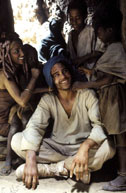
Movie Guru Rating:

Comment
on this review
| |

The lightweight Four Feathers gets lost among the dunes.
by Coury Turczyn
It rests on the horizon ever out of reach, like a glittering mirage tempting filmmakers to their dooms: Lawrence of Arabia. Although a controversial film on its release in 1962, David Lean's bio-pic of World War I adventurer T.E. Lawrence is now recognized as the "perfect" epic film. It effortlessly marries grand spectacle and intimate detail to show the life of one rather strange man during a historical turning point—one that is affecting world events to this day. Lawrence of Arabia is perhaps the only character study in film history to provide high adventure and true history, succeeding gloriously at both.
Naturally, a lot of other directors have taken a whack at it, too. From The Wind and the Lion to The English Patient, many filmmakers over the past 40 years have ardently followed the "desertscapes + historical battles + enigmatic hero = film classic" formula. None of them have quite pulled off the whole falafel, particularly the latest attempt to hit the medium-sized screens at our nation's cineplexes.
The Four Feathers offers almost everything required of such an epic film: A historical period exactingly reproduced, exotic locations in far-off desert lands, giant battles involving thousands of extras dying bloody deaths, and a handsome yet sensitive hero separated from his pining lady love. Add to this mix some lovely cinematography, strong acting, and a conflict that echoes modern-day issues, and you'd seemingly have a viable contender for the untouchable Lawrence of Arabia crown. Just one thing missing: a script that offers logic, context, and a real point.
Based on the 1898 novel by A.E.W. Mason, The Four Feathers tells the tale of one Harry Faversham (Heath Ledger), a young man following his father's famous footsteps into the British Army circa 1875. It is the height of the British Empire, when conquering "uncivilized" lands was considered a God-given imperative. (after all, those filthy heathens will be better off living under fine Christian "values," right?) When Faversham's company is ordered to Sudan to squash a native uprising, it suddenly occurs to him that he'd rather stay at home with his fiancé, Ethne Eustace (Kate Hudson). So he resigns his commission right before his mates ship off, and—amazingly enough—they think he's yellow. Each former friend sends him a white feather as a symbol of his cowardice, as does his sweet Ethne. Disturbed by this stinging rebuke, Faversham travels to the Sudan to redeem himself, which he achieves mostly be ambling around the desert in a parched daze.
The big problem here is director Shekhar Kapur's approach to dangerously dated material—he doesn't really have one. Setting a film in the world of British imperialism begs for some modern context, particularly in light of current events. Is it really hunky dory to root for the British Army to vanquish Sudanese fighters who are basically defending their tribal lands from foreign invaders? This moral question is barely posed, let alone answered. Yes, the English troops do look out of place in the desert wearing their buttoned-up red uniforms, and one arrogant officer calls a native a "dirty wog," but Kapur never really addresses the underlying—or even overlying— conflicts behind this war. We don't know what the Brits are doing there or how they've affected the area, who the rebel leader "Madi" is, what the natives are really like, or what the politics are that inspire all this killing. The war is just a vague backdrop for Faversham's journey to manhood.
If his journey were a notable one, then perhaps we'd still have a movie that made sense. But here, too, the script by Michael Schiffer and Hosseign Amini gives us little substance to ponder but many logic gaps to puzzle over. After Faversham aimlessly wanders the desert and almost dies, he is rescued by Abou Fatma (Djimon Hounsou), a nomadic African warrior who proceeds to selflessly aid Faversham every step of the way. In fact, he pretty much does everything for him, including rescuing Faversham's now-endangered pals. Why? "Because God put you in my path." This doesn't seem like much motivation for a fearsome man-killer who would seemingly have more in common with the guerrillas of the Madi than the British troops who would just as soon whip him to death. Nevertheless, he is there whenever Faversham needs him—and Faversham needs him quite often since he's a rather inept rescuer. But no matter how convincing the amazing Hounsou plays Abou, you can only wonder why his character is bothering to help such an annoying wuss like Faversham. (In fact, Kapur should've ditched the whole Mason novel and made a movie about Abou, who's far more interesting than any of the English "heroes.")
Finally, Faversham returns to England a real man, thus getting his girl back and clearing his reputation of those nasty charges of cowardice. At this point, you may still be asking: "What's the point?" Thankfully, Faversham's best buddy Jack (Wes Bentley, when will you find a good role?) is there to provide a rousing speech to put everything into perspective. You see, the Queen's armies didn't traverse the globe slaughtering native resisters for the profit of the British government—no, soldiers just fight for their buddies in the trenches. That may be true, but it's a weak sentiment capping a shamefully morally ambiguous film. It makes you wonder why The Four Feathers was even made.
Coury Turczyn is the publisher of PopCult.

September 26, 2002 * Vol. 12, No. 39
© 2000 Metro Pulse
|





